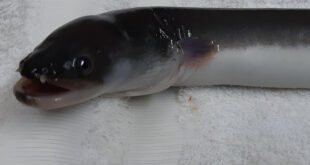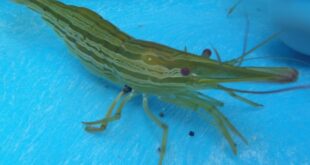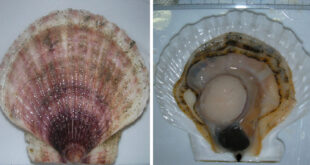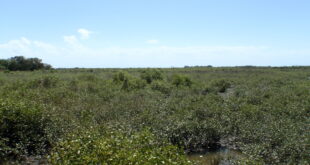
Dr. Felix Ayson is the new Chief of SEAFDEC Aquaculture Department (AQD) to serve a two-year term of office starting 29 June. A career fisheries scientist specializing on biotechnology, marine fish hatchery and climate change, Dr. Ayson was selected based on the results of a search process facilitated by the (Philippine) Department of Agriculture. He was endorsed by Hon. Benigno Aquino III, Philippine President, and his nomination was affirmed by the SEAFDEC Council.
In his first address to the AQD community, Dr. Ayson stressed the importance of AQD’s work plan on five thematic programs to address food security, poverty alleviation and sustainability issues in aquaculture in Southeast Asia. AQD’s thematic programs, adopted in 2011 at the ASEAN-SEAFDEC conference on sustainable fisheries, include (1) meeting social &economic challenges; (2) ensuring quality seed; (3) developing healthy & wholesome aquaculture; (4) maintaining environmental integrity thru responsible aquaculture; and (5) adapting to climate change.
To realize AQD’s strategic plans on these themes, the new Chief said he plans to expand AQD’s technology transfer efforts to include a wider clientele by (1) focusing onfisheries schools to enable them to put up small-scale aquaculture facilities that can be used as a laboratory and as a technology showcase; and by (2) intensifying collaboration with DA-BFAR which has a better reach in the Philippines with their regional fisheries training centers (RFTCs) all over the country. He also said he will address the lack of expertise at AQD in highly specialized fields (like biotechnology) by recruiting highly-qualified staff according to a rational manpower development target. Regarding the funding of AQD programs, he encouraged AQD researchers to be aggressive in seeking grants through innovative research proposals.
Dr. Ayson promised a transparent, just and fair management that will listen to all AQD employees; in return, he said he expects innovation, hard work and dedication.
“I am strict, but reasonable,” he said. “And, we AQD employees must have only one loyalty and that is to AQD; we must have one motivation and that is service to all the stakeholders; and we must have only one guide and that is AQD’s triple mandate of research, human resources development & information dissemination.”
Dr. Ayson completed his post-doctoral fellowship at Kitasato University in Japan (2000) through a grant from JSPS (Japanese Society for the Promotion of Science); acquired his PhD in Zoology major in fish physiology and endocrinology from theOcean Research Institute of theUniversity of Tokyo (Japan) in 1994; and obtained his MScand BSc in Marine Biology from the University of the Philippines Diliman (1987) and University of San Carlos (1981, cum laude), respectively.
As an AQD scientist rising through the ranks (he was first employed as a senior research assistant in 1986), Dr. Ayson has so far published 16 science papers in peer-reviewed international journals as sole author or first author. He has received research grants on rabbitfish from USAID (2001-2004) and AusAID (2004-2005); the latter was for an award-winning proposal on siganid culture for a rural community. More recently, he has received a milkfish grant fromUSAID-AquaFish CRSP (2007-2009) and is a current collaborator of a DOST-PCAAARD milkfish project with UP Visayas. He has headed AQD’s programs on marine fish and climate change, which included research, training & information, and extension activities for aquaculture stakeholders.
In between his stints at AQD, he served as the Chief Technical Advisor on aquaculture for the United Nations Food and Agriculture Organization in Rome, Italy (2007–2010); he was a visiting professor at the Tropical Biosphere Research Center of the University of Ryukyus in Okinawa, Japan (2005–2006); and he was a research fellow in Kitasato University (1997–1999).
Dr. Ayson is 51 years old; hails from Candijay, Bohol, Philippines; is married to Dr. Evelyn Grace de Jesus-Ayson, also an AQD scientist; and has two children.
With the new leadership, the AQD community is looking forward to better serve the needs of aquaculture stakeholders in ASEAN-SEAFDEC member-countries.
 SEAFDEC/AQD Southeast Asian Fisheries Development Center | Aquaculture Department
SEAFDEC/AQD Southeast Asian Fisheries Development Center | Aquaculture Department



